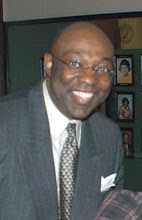Dear Colleagues,
Kim "PCG Intern" Campbell wrote a profound blog, and raised an important issue concerning the July 23-24, 2008 CNN discussion on what it means to be Black in America. She raised an important question at the end of her revealing blog. She asked that I read it and share some comments on its content. She asked what we can do to change the mindset of Blacks in America. My thoughts are as follows.
THE ORIGIN OF “ACTING WHITE” IN AMERICA
Most cultures have created a system of acceptable behavior. If you do not support your race or culture, you can be labeled by that culture with a symbol. For instance, African Americans who do not support their culture are labeled as an “Oreo”, black on the outside and white in the middle. Native Americans refer to one from their culture as an “apple” –red on the outside and white on the inside. Likewise, Asian Americans refer to themselves as a “banana”, yellow on the outside and white on the inside. The Latinos label their members as a “coconut”-brown on the outside and white on the inside. Hargrove asserts that these are self-imposed descriptors.
When approaching this topic on “Blackness” or “Am I Black Enough for You”, one has to understand that there are at least two key assumptions operating in the environment. The way that race plays itself or should I say displays itself in America, can be traced to the following assumptions:
1) I am better than you because I have all the “physical attributes” to be placed ahead of you in the societal pecking order. Example, I have good hair, and you have bad hair; I have two parents, and you come from a single parent home; I have a car, and you ride the bus; I have middle class friends and you are ghetto; I live in an upscale community, and you live in the projects; I have a wardrobe, and you all have clothing; and
2) Because I have all these things, I am closer to “Whiteness” than you. This is a “mental assumption” that allows one to believe that he/she is better than another. The way these two assumptions play out in America is through a “divide and conquer” mentality. The two assumptions met head on in 1992 and crashed. The Rodney King verdict caused the middle class Blacks to see themselves as no better off than the poor Blacks. As a result of a racially divided society, after the Rodney King verdict, followed by the O.J. Simpson verdict in 1994, Blacks were gradually forced into a unified position.The Million Man March of October 16, 1995, spearheaded by Minister Louis Farrakhan, was able to galvanize significant numbers of Black men to Washington D.C. The country had been more polarized than ever. Middle class Black students had begun to see society through the lenses of poor black students. In public schools in America, smart Blacks no longer wanted to “act white,” by displaying their intellectual prowess. In other words, being smart was rejected by large numbers of both poor and middle-class Blacks.
The Gena Six issue in the 2006-2007 school year created a new re-awakening in the younger generation, and the cause for social justice began to surface by a newer generation. In summer 2006, the demise and burial of the “N” word and the resistance to call or refer to Black women as the “B” word and the “H” word caused a pause in the negative images perpetuated by Blacks toward Blacks. In 2008, the good news and positive signs continue to emerge, particularly with huge numbers of young people registering and participating in local governance and national elections. This renewal of energy has stirred the souls of this new generation to make positive changes in America.
The 2008 Presidential campaign of Senator Barack Obama has done more to instill a sense of pride and unity because he is viewed by many to be a qualified candidate who can represent this nation as President of the United States. As a result of this, young African Americans are now talking in culturally prideful terms. The time is right for real education reform to begin in America so that gaps in learning and achievement can be closed. As Dr. King would say, the fierce urgency of [the moment is] now!—Dr. Jesse Hargrove
Wednesday, July 30, 2008
Subscribe to:
Posts (Atom)
